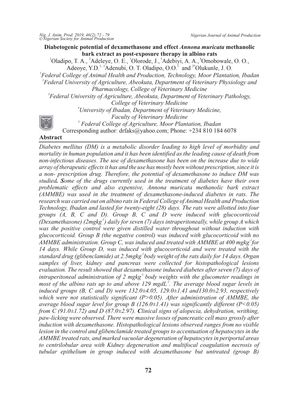Diabetogenic Potential of Dexamethasone and Effect of Annona Muricata Methanolic Bark Extract as Post-Exposure Therapy in Albino Rats
December 2020
in “
Nigerian journal of animal production
”

TLDR Dexamethasone can cause diabetes in rats, and Annona muricata bark extract may help lower blood sugar.
The study investigated the potential of dexamethasone to induce diabetes mellitus (DM) in albino rats and the therapeutic effects of Annona muricata methanolic bark extract (AMMBE) as a treatment. Over 28 days, rats were divided into four groups: Group A (positive control) received distilled water, Group B (negative control) was induced with dexamethasone (2 mg/kg) without AMMBE treatment, Group C was induced with dexamethasone and treated with AMMBE (400 mg/kg) for 14 days, and Group D was induced with dexamethasone and treated with the standard drug glibenclamide (2.5 mg/kg) for 14 days. Dexamethasone induced diabetes in the rats after seven days, with blood sugar levels reaching above 129 mg/dL. Post-treatment, Group C and D showed a significant reduction in blood sugar levels compared to Group B. Clinical signs of alopecia, dehydration, and other symptoms were observed, and histopathological analysis showed massive losses of pancreatic cell mass and liver and kidney damage in the dexamethasone-induced group. The study concluded that dexamethasone can induce diabetes with prolonged use and that AMMBE has an antidiabetic effect that warrants further exploration.



